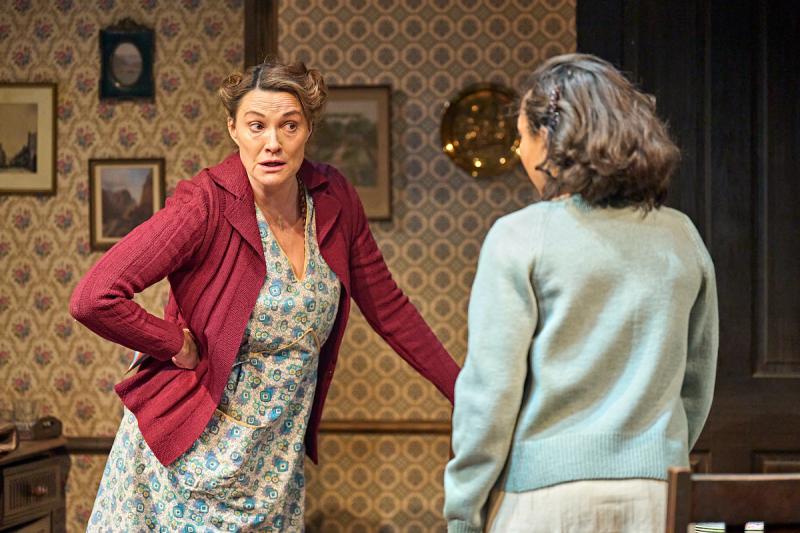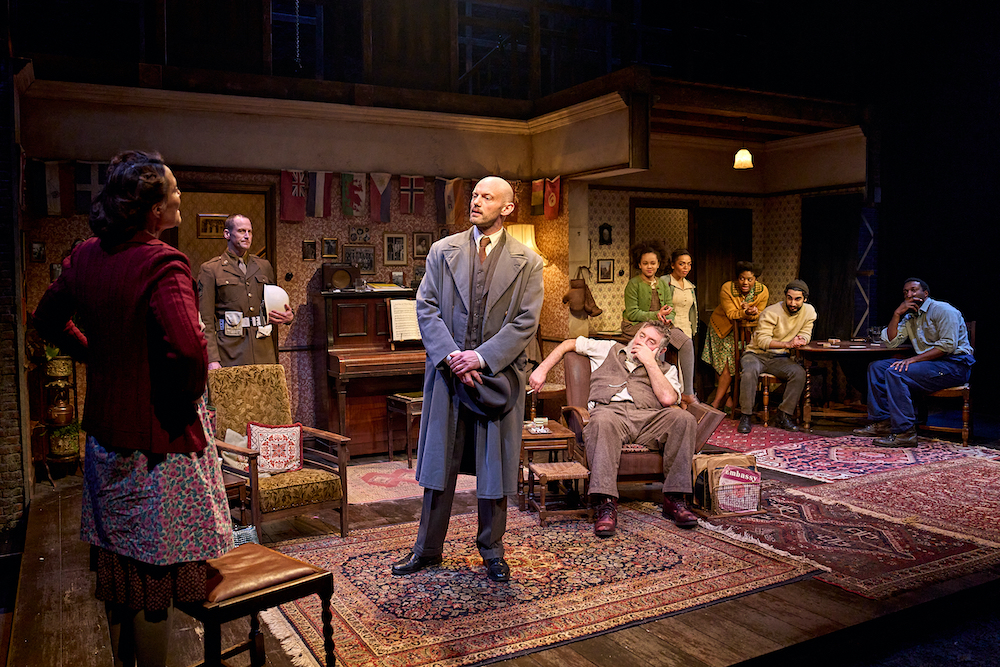Trouble in Butetown, Donmar Warehouse review - entertaining and warmhearted | reviews, news & interviews
Trouble in Butetown, Donmar Warehouse review - entertaining and warmhearted
Trouble in Butetown, Donmar Warehouse review - entertaining and warmhearted
History play about an African-American GI in Cardiff never really takes off

With the fast-approaching anniversary of the latest war in Europe, our culture’s continued fascination with World War Two gets a contemporary boost from Trouble in Butetown at the Donmar Warehouse.
Written by Diana Nneka Atuona, this follow-up to Liberian Girl, her 2015 debut, won the 2019 George Devine Award for most promising playwright. Although it revisits familiar territory, and adopts a deliberately traditional theatre form, it includes an interesting slant on race, multiculturalism and the Special Relationship between the UK and the USA.
Set in Butetown, or Tiger Bay, a port area in south Cardiff with a history of multiculturalism, the background of the play is the arrival of American soldiers to help defeat the Nazis in Europe. But although they were part of the Allied push to eradicate fascism, they brought their own prejudices with them. Because of the racially segregated society of the Southern states, white and African-American soldiers were divided into separate platoons, housed in separate barracks, and had separate food and medical staff. They came accompanied by the Jim Crow laws. So in Cardiff, socialising with locals was forbidden, and the vicious white-helmeted military police (known as "Snowdrops") kept control.
Set in an illegal guesthouse run by the redoubtable but impoverished Gwyneth, who supplements her income by distilling vile alcoholic spirits in the backyard, the story begins with a tableau of her tenants: old sea-dog Patsy, Black-British sailor Norman (who quotes Marcus Garvey), and Dullah (a Muslim who loves drink as much as the Quran). Gwyneth is a war widow, and has two half-Nigerian daughters, the teenage Connie and little Georgie, who loves her absent father, a boxer in civilian life, and who dreams of making a heroic contribution to the war effort. She gets her chance when she bumps into Nate, an African-American soldier from Georgia, in hiding from the military police.
There is a lot of fun in some scenes, especially when little Georgie is involved, but the overall theme of people’s inherent goodness in this multicultural environment does smooth out a lot of the conflicts, although there is a very strong moment when Norman confronts Nate. The piece’s vision of a large extended family, which is mixed and yet mutually supportive, is rather idealistic – as is the traditional theatre format of a well-made play. Some of the plotting is a bit clumsy, and a rather tender story about Nate and Connie’s love is uncomfortably squeezed into a bigger drama, while the parallel strand about Peggy and Dullah is underwritten. Also, relying heavily on the rather cute figure of Georgie does introduce an unnecessary sentimentality to the show.
There is likewise something a bit disturbing in the central ethical proposition that killing a racist, even in self-defence, is somehow okay, although Atuona does make Nate suffer for the fact that his best buddy has been punished for something that Nate himself was responsible for. Despite the fact that the arrival of an American military policeman and a Welsh cop raises the stakes, Gwyneth’s danger – arrest for harbouring a fugitive and prosecution for an illegal guesthouse and selling dangerous alcohol – is rather downplayed, and none of the other characters seem to be risking much. The smiles of comedy mask the pains of the past.
So although Trouble in Butetown reminds us strongly of the overt racism of the 1940s, and does a good job in showing some of the fun of a traditional community – Connie’s love of singing is twice beautifully demonstrated – the play never really takes off. This is partly because neither Atuona, nor her director Tinuke Craig, are able to sufficiently animate the large cast scenes (pictured above), which often turn out to have two characters speaking while the rest sit around mutely watching. Despite these drawbacks, it has to be said that this is a warmhearted evening, performed on a finely detailed set by designer Peter McKintosh and with lovely music by Clement Ishmael.
The cast features some agreeable performances, with Sarah Parish’s tough Gwyneth – whose scowl can curdle milk – dominating the menfolk: Ifan Huw Dafydd’s tolerant Patsy, Zephryn Taitte’s drink-loving Norman and Zaqi Ismail’s Dullah. Both Rita Bernard-Shaw (Connie) and Samuel Abewunmi (Nate) make their stage debuts, with the former in fine singing voice. Ten-year-old Rosie Ekenna, also making her stage debut, is Georgie (sharing the part with Ellie-Mae Siame), a bundle of energetic fun that does a lot to encourage audience sympathy for the whole production. Some humane and funny moments help smooth out the bumps in the writing – it all makes for an entertaining show.
rating
Explore topics
Share this article
The future of Arts Journalism
You can stop theartsdesk.com closing!
We urgently need financing to survive. Our fundraising drive has thus far raised £49,000 but we need to reach £100,000 or we will be forced to close. Please contribute here: https://gofund.me/c3f6033d
And if you can forward this information to anyone who might assist, we’d be grateful.

Subscribe to theartsdesk.com
Thank you for continuing to read our work on theartsdesk.com. For unlimited access to every article in its entirety, including our archive of more than 15,000 pieces, we're asking for £5 per month or £40 per year. We feel it's a very good deal, and hope you do too.
To take a subscription now simply click here.
And if you're looking for that extra gift for a friend or family member, why not treat them to a theartsdesk.com gift subscription?
more Theatre
 Hamlet, National Theatre review - turning tragedy to comedy is no joke
Hiran Abeyeskera’s childlike prince falls flat in a mixed production
Hamlet, National Theatre review - turning tragedy to comedy is no joke
Hiran Abeyeskera’s childlike prince falls flat in a mixed production
 Rohtko, Barbican review - postmodern meditation on fake and authentic art is less than the sum of its parts
Łukasz Twarkowski's production dazzles without illuminating
Rohtko, Barbican review - postmodern meditation on fake and authentic art is less than the sum of its parts
Łukasz Twarkowski's production dazzles without illuminating
 Lee, Park Theatre review - Lee Krasner looks back on her life as an artist
Informative and interesting, the play's format limits its potential
Lee, Park Theatre review - Lee Krasner looks back on her life as an artist
Informative and interesting, the play's format limits its potential
 Measure for Measure, RSC, Stratford review - 'problem play' has no problem with relevance
Shakespeare, in this adaptation, is at his most perceptive
Measure for Measure, RSC, Stratford review - 'problem play' has no problem with relevance
Shakespeare, in this adaptation, is at his most perceptive
 The Importance of Being Earnest, Noël Coward Theatre review - dazzling and delightful queer fest
West End transfer of National Theatre hit stars Stephen Fry and Olly Alexander
The Importance of Being Earnest, Noël Coward Theatre review - dazzling and delightful queer fest
West End transfer of National Theatre hit stars Stephen Fry and Olly Alexander
 Get Down Tonight, Charing Cross Theatre review - glitz and hits from the 70s
If you love the songs of KC and the Sunshine Band, Please Do Go!
Get Down Tonight, Charing Cross Theatre review - glitz and hits from the 70s
If you love the songs of KC and the Sunshine Band, Please Do Go!
 Punch, Apollo Theatre review - powerful play about the strength of redemption
James Graham's play transfixes the audience at every stage
Punch, Apollo Theatre review - powerful play about the strength of redemption
James Graham's play transfixes the audience at every stage
 The Billionaire Inside Your Head, Hampstead Theatre review - a map of a man with OCD
Will Lord's promising debut burdens a fine cast with too much dialogue
The Billionaire Inside Your Head, Hampstead Theatre review - a map of a man with OCD
Will Lord's promising debut burdens a fine cast with too much dialogue
 50 First Dates: The Musical, The Other Palace review - romcom turned musical
Date movie about repeating dates inspires date musical
50 First Dates: The Musical, The Other Palace review - romcom turned musical
Date movie about repeating dates inspires date musical
 Bacchae, National Theatre review - cheeky, uneven version of Euripides' tragedy
Indhu Rubasingham's tenure gets off to a bold, comic start
Bacchae, National Theatre review - cheeky, uneven version of Euripides' tragedy
Indhu Rubasingham's tenure gets off to a bold, comic start

Add comment